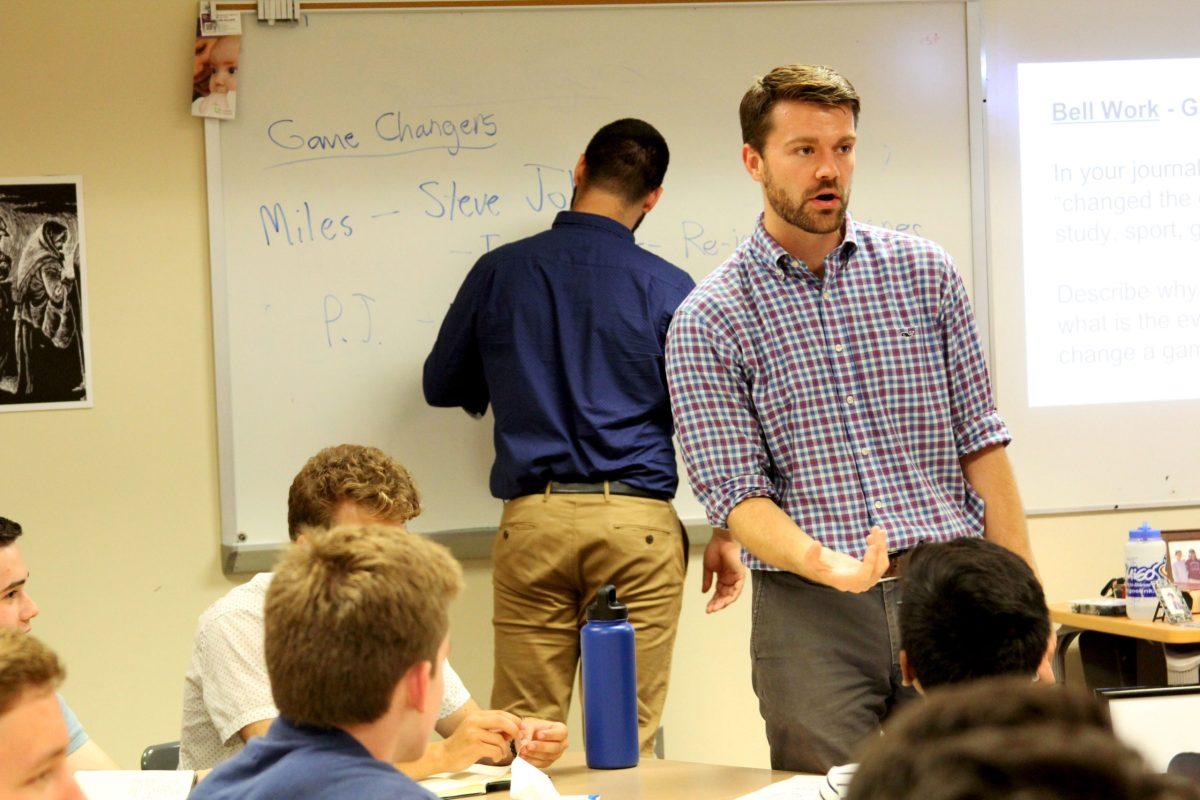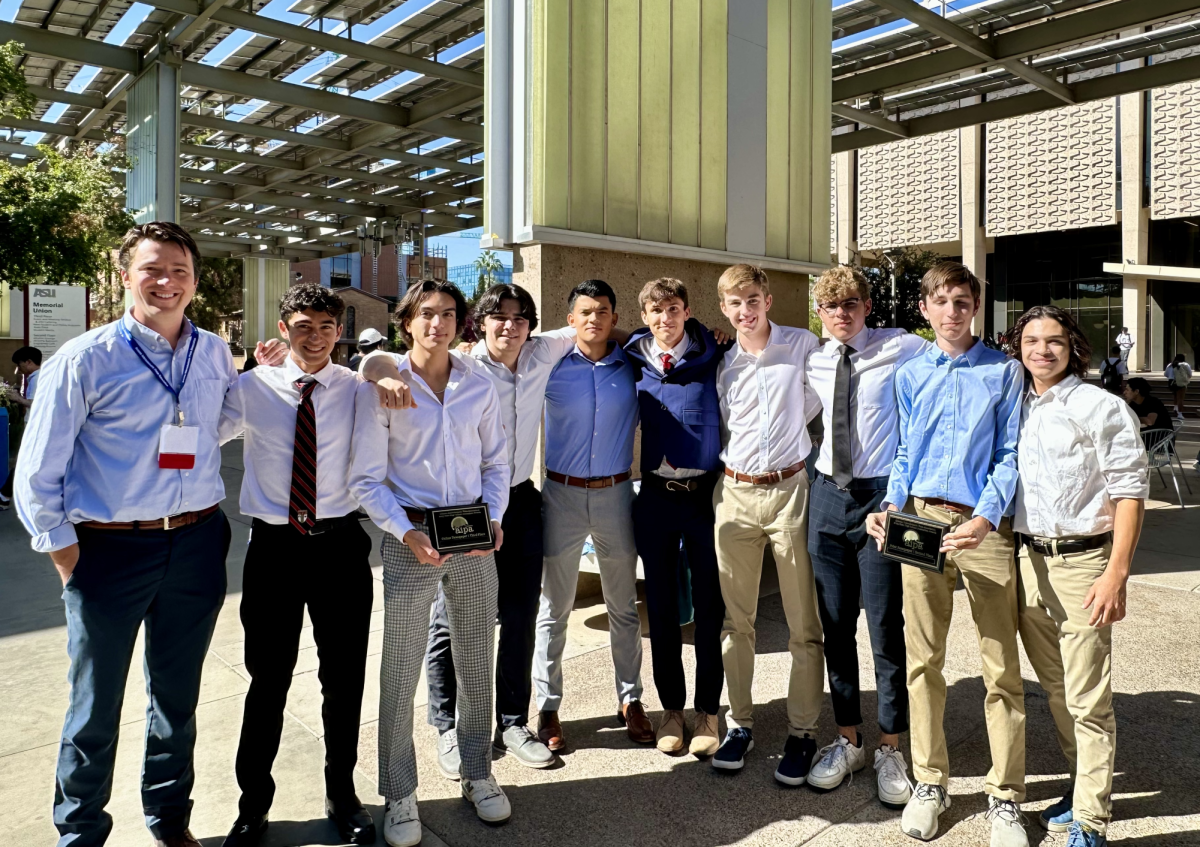By Hayden Welty ’19
THE ROUNDUP
While the “college prep” aspect of the Brophy mission features prominently in the very name of the institution –– Brophy College Preparatory –– the school seeks to instill more than just academic prowess in its students, according to www.brophyprep.org.
“Inspired by St. Ignatius of Loyola, the education of every Brophy student is focused on having them graduate as young men who are open to growth, intellectually competent, religious, loving and committed to doing justice,” the website said about its Jesuit-informed Graduate at Graduation values, otherwise known as the five “Grad at Grad” concepts.
Freshmen English teacher Mr. Scott Middlemist ’87 said that it is important to integrate the Grad at Grad concepts from the very beginning.
“It is the thematic foundation of Brophy’s English 1 curriculum, so … [t]he Grad at Grad is a key part of our discussions, essays and projects throughout the year,” he said in an email interview with The Roundup.
“I didn’t know about the Grad at Grad at first, but after writing essays, I understand the values Brophy is trying to have us [adopt],” said freshman student Alex Zoneraich ’21 who is enrolled in Mr. Middlemist’s class. “I can start applying those to everyday life.”
Beyond their first year of studies, Mr. Middlemist also said that Brophy spends significant effort developing these concepts in students.
“The five concepts are encountered in classrooms, athletics, clubs, retreats and on immersion trips,” he said. “The concepts drive Brophy’s mission, and the faculty are dedicated to immersing all students in them over the course of four years.”
At the end of a student’s tenure, they will be required to take Senior Synthesis, which is a semester-long religious course centered around a large academic paper where students reflect on their Brophy experience and assess how they lived up to what was asked of them––including the five Graduate at Graduate values.
Encountering Jesus in the Sacraments instructor Mr. Edward Chow said that the Grad at Grad works to develop the whole person, a philosophy embodied by the Latin phrase cura personalis.
“Oftentimes guys will come into 9th grade, and they might be intellectual superstars, straight A students, but in terms of what the rest of what it means to be a human person, that’s not quite developed, not through any fault of their own,” Mr. Chow said. “Part of the educational system is [focusing] on intellect, but part of being here at Brophy is getting involved in things like sports, clubs, service.”
‘We need deep kinship with people on the margins and care for people on the margins and solidarity for people on the margins in every single part of our world.’
First-year Senior Synthesis teacher Mrs. Megan Agliano said that the facets of the Grad at Grad should always be used in the service of other people.
“It’s the idea that all of our gifts and talents, every aspect of ourselves that we develop is done for and with others, even if that’s intellectually competent,” she said. “If it’s someone who excels at that, ideally they’d use those skills in service of the world –– committed to doing justice.”
Brophy Principal Mr. Bob Ryan said that he sees the value of committed to doing justice as having a preferential option for the poor, and while each person is called to live out this commitment in different ways, it should not be an easily-disregarded thought.
“That’s something we don’t just think about on Sundays when we’re in Church,” he said. “That is a commitment of our life that we think about: ‘How can our gifts and talents be put to use in the service of a world that desperately needs it?’”
Mr. Orem echoed the sentiment that the world possesses a deep urgency for more commitment to the poor.
“We need deep kinship with people on the margins and care for people on the margins and solidarity for people on the margins in every single part of our world,” he said.
Mr. Ryan described the vocation to be committed to doing justice as living a life in relationship with God and with a radical commitment to others.
Regardless of how one lives out this calling, he said, there is no opt-out clause.
“People live that vocation out differently. I would not draw a distinction between those that work with refugees and those that sell real estate because that distinction then allows for distancing…,” Mr. Ryan said. “As human beings, we’re all called to that [vocation] because ultimately that’s what leads us to God, that’s what leads us to fulfillment, that’s what brings us true joy, that’s what gives our lives meaning.”
‘The difference between spiritual and religious is that I’m spiritual to me and my bedroom and my headphones and God, but when we’re called to be religious, it means we’re called to be active and vibrant members of the faith community.’
Mr. Ryan also said that he thinks Brophy needs to stress the difference between spiritual and religious, which, he said, is living in isolation versus living in community.
“The difference between spiritual and religious is that I’m spiritual to me and my bedroom and my headphones and God, but when we’re called to be religious, it means we’re called to be active and vibrant members of the faith community,” Mr. Ryan said.
He said he believes this is an aspect of the Brophy education on which the school still needs to improve.
“Unless [students] come from a very religious family, [they’re] not going to encounter in the world beyond this place a call to be religious,” Mr. Ryan said. “And I think there’s real, real value there.”
Mr. Orem said that enriching students’ personal faith, regardless of whether or not they were Catholic or Jewish, for example, is the goal of the religion department.
“That’s the wildest hope we could have: I couldn’t imagine a better success story,” he said. “I remember when the chair of our religion department came to me weeping after reading synthesis essays at the end of last year, weeping because he had two Jewish students share how they were more devout in their faith.”
Zoneraich said he has already noticed how his Catholic education was beginning to help his own faith.
“The Jesuits and Judaism have very similar morals and values … ,” he said. “[Brophy is] just making myself more aware of how I come off to other people and what values I see in myself.”
‘[We] don’t want to be anything but a school, but we are a Catholic school. That’s a different beast; we’re just not up to what BASIS does.’
Mr. Ryan also said it is often hard to balance the athletic, academic and collegiate pressures of a traditional “college preparatory” high school with reflection on the Grad at Grad values. He said that the school will push students to cope with that tension.
“We’re going to put a lot out there and then we’re going to try and help you guys discern how to live in that tension,” Mr. Ryan said. “How do you be really active and really engaged but also leave time for reflection? That’s a real challenge, and I’d say that something we need to get better at.”
Mr. Orem said he recognized a similar dichotomy.
“Myself as a teacher, us as a religious department and us as a school need to learn and be courageous enough to [be open to the day we might need to let go of some of the successes of being] … college prep, so that we can more fully embrace Jesus … ,” he said. “Brophy is two-voiced [about its mission. That creates a tension] … I think we’re always in that tension, and I think the Spirit is disruptive as much as it is comforting, and we always need to be asking ourselves how can we be following Christ more closely?”
“[We] don’t want to be anything but a school, but we are a Catholic school. That’s a different beast; we’re just not up to what BASIS does,” Mr. Orem said. “It’s not like that … We’re up to something fundamentally different.”
























